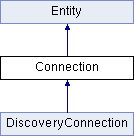Connection interface (required). More...

Public Member Functions | |
| Session | createSession (Properties properties) throws AdapterException |
| Creates a Session. More... | |
| void | deleteSession (Session session) throws AdapterException |
| Deletes a Session. More... | |
| StreamReader | createStreamReader (Session session, StreamInfo streamInfo, Properties properties, StreamReaderListener listener) throws AdapterException |
| Creates a StreamReader. More... | |
| void | deleteStreamReader (StreamReader streamReader) throws AdapterException |
| Deletes a StreamReader. More... | |
| StreamWriter | createStreamWriter (Session session, StreamInfo streamInfo, Properties properties) throws AdapterException |
| Creates a StreamWriter. More... | |
| void | deleteStreamWriter (StreamWriter streamWriter) throws AdapterException |
| Deletes a StreamWriter. More... | |
 Public Member Functions inherited from Entity Public Member Functions inherited from Entity | |
| void | update (Properties properties) throws AdapterException |
| Updates the configuration of an adapter entity. More... | |
Detailed Description
Connection interface (required).
A Connection object provides access to a data domain (such as a DDS domain or a JMS network provider).
In the XML configuration file, Connections are created using the tag <connection> within a DomainRoute.
Member Function Documentation
◆ createSession()
| Session createSession | ( | Properties | properties | ) | throws AdapterException |
Creates a Session.
A Session is a concurrency unit within a Connection that has an associated set of StreamReaders and StreamWriters. Access to the StreamReaders and StreamWriters in the same Session is serialized by RTI Routing Service.
Session objects are created when the associated routing service sessions are enabled.
In the XML configuration file, Sessions are associated with the tag <session> within a domain route.
Required: No
The Java implementation of this method can return null if sessions are not required by the adapter.
- Parameters
-
properties <<in>> Configuration properties for the Session.
- Returns
- New Session if successful.
- Exceptions
-
AdapterException - if an error occurs.
◆ deleteSession()
| void deleteSession | ( | Session | session | ) | throws AdapterException |
◆ createStreamReader()
| StreamReader createStreamReader | ( | Session | session, |
| StreamInfo | streamInfo, | ||
| Properties | properties, | ||
| StreamReaderListener | listener | ||
| ) | throws AdapterException |
Creates a StreamReader.
A StreamReader provides a way to read samples of a specific type from a data domain.
In the XML configuration file, StreamReaders are associated with the tag <input> within <route> or <auto_route>.
This method is called when the route is enabled and the 'creation mode' condition associated with the route's input becomes true.
Required: Only when the adapter is used to read data.
The Java implementation of this method can return null if the adapter is not used to read data.
- Parameters
-
session <<in>> Session associated with the StreamReader. This parameter is null if Sessions are not used by the adapter. streamInfo <<in>> Name of the stream and type representation. properties <<in>> Configuration properties for the StreamReader. listener <<in>> The listener of the StreamReader used to notify the routing service when new data is available.
- Returns
- New StreamReader if successful.
- Exceptions
-
AdapterException - if an error occurs.
◆ deleteStreamReader()
| void deleteStreamReader | ( | StreamReader | streamReader | ) | throws AdapterException |
Deletes a StreamReader.
A StreamReader object is deleted when the route that contains it is disabled, when the 'creation mode' condition associated with the route's input becomes false or when RTI Routing Service is closed.
Required: Only when the adapter is used to read data.
- Parameters
-
streamReader <<in>> StreamReader to be deleted.
- Exceptions
-
AdapterException - if an error occurs.
◆ createStreamWriter()
| StreamWriter createStreamWriter | ( | Session | session, |
| StreamInfo | streamInfo, | ||
| Properties | properties | ||
| ) | throws AdapterException |
Creates a StreamWriter.
A StreamWriter provides a way to write samples of a specific type in a data domain.
In the XML configuration file, StreamWriters are associated with the tag <output> within <route> or <auto_route>.
This method is called when the route is enabled and the 'creation mode' condition associated with the route's output becomes true.
Required: Only when the adapter is used to write data. The Java implementation of this method can return null if the adapter is not used to write data.
- Parameters
-
session <<in>> Session associated with the StreamWriter. This parameter is null if Sessions are not used by the adapter. streamInfo <<in>> Name of the stream and type representation. properties <<in>> Configuration properties for the StreamWriter.
- Returns
- New StreamWriter if successful.
- Exceptions
-
AdapterException - if an error occurs.
◆ deleteStreamWriter()
| void deleteStreamWriter | ( | StreamWriter | streamWriter | ) | throws AdapterException |
Deletes a StreamWriter.
A StreamWriter object is deleted when the route or domain route that contains it is disabled, when the 'creation mode' condition associated with the route's output becomes false or when RTI Routing Service is closed.
Required: Only when the adapter is used to write data.
- Parameters
-
streamWriter <<in>> StreamWriter to be deleted.
- Exceptions
-
AdapterException - if an error occurs.